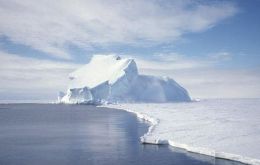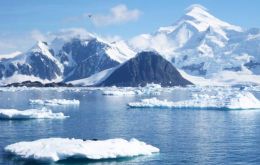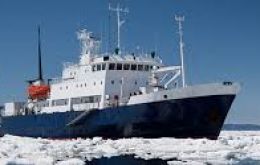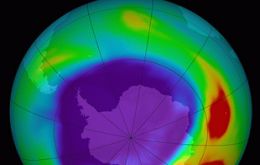MercoPress. South Atlantic News Agency
Tag: Antartica
-
Wednesday, May 28th 2014 - 22:04 UTC
Antarctica ice sheet melting episodes have occurred over the last 14.000 years, say scientists

A new study has found that the Antarctic Ice Sheet began melting about 5,000 years earlier than previously thought coming out of the last ice age, and that shrinkage of the vast ice sheet accelerated during eight distinct episodes, causing rapid sea level rise.
-
Tuesday, May 20th 2014 - 08:19 UTC
Antarctica ice sheet loss has doubled since 2010, shows CryoSat satellite

The Antarctic ice sheet has lost ice twice as quickly in the past three years as when it was last surveyed between 2005 and 2010, say scientists. Results from the CryoSat-2 satellite mission, published Monday in the journal Geophysical Research Letters, say the largest ice sheet on Earth is now losing 159 billion tons of ice each year.
-
Wednesday, May 7th 2014 - 06:21 UTC
Live avian influenza virus discovered in Antarctica Adélie penguins

Researchers have found a new type of avian influenza virus in a group of Adélie penguins (pygoscelies adeliae) from Antarctica. Aeron Hurt, PhD, a senior research scientist at the WHO Collaborating Centre for Reference and Research on Influenza in Melbourne, Australia, said that this is the first time that a distinct, live flu virus has been found in these birds.
-
Saturday, January 11th 2014 - 07:48 UTC
Russian vessel incident triggers debate on Antarctica growing tourist industry

The challenging rescue operation launched after a Russian ship became trapped in Antarctic pack ice in December shows the inherent risks facing the frozen continent's burgeoning tourist industry, experts say. Antarctica represents one of the last frontiers for adventurous travelers, an icy wonderland of glaciers, emperor penguins and seemingly endless white expanses.
-
Wednesday, December 25th 2013 - 22:03 UTC
Three icebreakers to the rescue of Antarctica trapped Russia's 'Akademic Shokalskiy'

Seventy four people spent Christmas aboard a cruise ship that has become stuck in the ice in a remote region off the coast of Antarctica and rescue vessels are at least two days away, according to Australian maritime officials. Three icebreakers are sailing to the rescue.
-
Tuesday, October 22nd 2013 - 05:31 UTC
Ozone layer hole reaches Argentine and Chilean Patagonia

The hole in the ozone layer over Antarctica stretched for the third time this year to reach cities in the south of Argentina and Chile according to the Izaña Atmospheric research centre in Tenerife, Canary Islands.
-
Thursday, October 10th 2013 - 05:18 UTC
Scientists find huge water channels flow underneath Antarctica’s ice cap

Channels nearly as tall as the Eiffel Tower gouge into the undersides of floating ice in western Antarctica. The recently discovered channels could influence how quickly Antarctic ice sheets slip into the sea, melt, and contribute to rising sea levels.
-
Monday, August 26th 2013 - 08:25 UTC
Rising sea temperature will reduce krill growth habitat in Antarctica

Antarctic krill are usually less than 6 cm in length, but their size belies the major role they play in sustaining much of the life in the Southern Ocean. They are the primary food source for many species of whales, seals, penguins and fish.
-
Thursday, July 25th 2013 - 02:51 UTC
Coastal Antarctic permafrost melting faster than expected

For the first time, scientists have documented an acceleration in the melt rate of permafrost, or ground ice, in a section of Antarctica where the ice had been considered stable. The melt rates are comparable with the Arctic, where accelerated melting of permafrost has become a regularly recurring phenomenon, and the change could offer a preview of melting permafrost in other parts of a warming Antarctic continent.
-
Thursday, July 11th 2013 - 07:08 UTC
Eight times Manhattan island iceberg breaks off from Antarctic glacier

Pine Island Glacier (PIG), the longest and fastest flowing glacier in the Antarctic, has spawned a huge iceberg. The block measures about 720 sq km in area - roughly eight times the size of Manhattan Island in New York.
